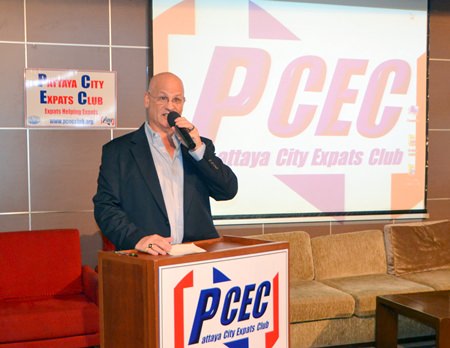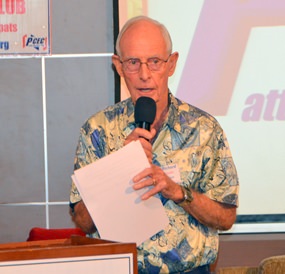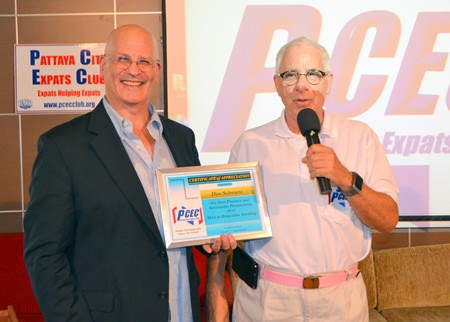No one has a bad memory! But many people have an untrained memory. Training one’s memory was the topic of Dan Schwartz, an expert in sales and marketing management at the Sunday, August 10 meeting of the Pattaya City Expats Club. Dan is currently CEO of Dan Schwartz International and serves as Vice President-Account Director for the Versata Portfolio Companies, the second largest privately held Enterprise Software Company in the U.S.
Dan explained that Ron White, a two-time U.S. memory champion, has developed a system which is used by most memory experts. Ron’s system is based on the fact that our brains operate best with pictures, and that wherever possible to aid memory we should replace words, numbers and abstract ideas with images. These images are then “glued” together into memorable stories which can easily be recalled and decoded at whim.
 Dan Schwartz explains to the PCEC that no one has a bad memory, but rather they have an untrained memory; thus with some training, a person can improve their memory.
Dan Schwartz explains to the PCEC that no one has a bad memory, but rather they have an untrained memory; thus with some training, a person can improve their memory.
The system can be used to memorise anything. It involves five steps: 1- Focus (concentration), 2- Use of pictures (associating names and events with pictures), 3- Use of a filing system (location-based), 4- Glue (action or emotion), and 5- Review (repetitive).
 PCEC member Richard Smith invites his fellow wine lovers to attend the Amari Resorts monthly Wine Experience on the last Friday of the month; which includes free flow wine and food dishes to compliment the wines.
PCEC member Richard Smith invites his fellow wine lovers to attend the Amari Resorts monthly Wine Experience on the last Friday of the month; which includes free flow wine and food dishes to compliment the wines.
Dan gave a simple demonstration of how it works. He picked out ten locations in The Tavern, the room where the PCEC meets every Sunday and referred to them as “files”: the speaker’s table; the pillar next to the table; a TV monitor near the pillar; the dart board; the front door; the Manchester United football poster; the Liverpool football poster; a large electric fan; the speaker’s podium; and the large projection screen. He said that people, in the audience who attend the Club meetings regularly, or even fairly regularly, should be able to remember these locations easily, especially because they can picture them.
Dan then assigned a picture for everyone to envision for each location, as follows: a) on the speaker’s table a pile of money; b) on the pillar next to the table a clock; c) on the TV monitor a telephone; d) plants growing from the dart board, e) a reward sign tacked to the front door; f) on the Manchester United poster a soccer goal; g) a brain splattered over the Liverpool poster; h) an organizer being blown over the room by the fan; i) a BMW car sitting atop the speaker’s podium; j) a successful sports team being shown on the projection screen. Dan had the audience practice (review) remembering which image went with each location several times. The practice included going forward in order, backward in order, and than randomly out of order.
Then, Dan pointed out that the ten images in each of their “files” (location) could then be used to remember specific themes for a talk on how to run a successful business. He demonstrated this by noting how each image in its location would be associated with each of ten themes. The speaker would look at the location (file), remember the associated image, and then speak off the cuff on the theme it represented: A pile of money on the table (theme – you need money to run a business); Clock (theme – you need to invest time); Telephone (theme – good communications are essential); Plants (theme – the business needs to grow); Reward sign (theme – You need to reward good effort); Goal (theme – The business needs a goal); Brain (theme – knowledge of the business is essential); Organiser (theme – you need to be organised); BMW car (theme – you need to reward yourself when you are successful); and A successful sports team (theme – You need a team effort).
The 10 locations Dan had members of the audience learn as ten “files” could be used over and over for remembering other things; associating different images for themes or concepts with each file as needed. Dan said that a person needs 50-75 such files to have a decent memory. People can construct files based on objects in each room of their home or condo. Or they could use parts of the body. The possibilities are endless. Once a person has memorised the files, the challenge is to associate pictures of names or actions to each file.
 PCEC Master of Ceremonies Richard Silverberg presents Dan Schwartz a Certificate of Appreciation for instructive presentation to the Club.
PCEC Master of Ceremonies Richard Silverberg presents Dan Schwartz a Certificate of Appreciation for instructive presentation to the Club.
Dan said that Ron White had taught this system to a six-year-old girl and that she had used it to memorise the names of the 44 presidents of the U.S. People who have perfected this system could then attend a seminar or a speech and come away remembering 20 things instead of just two or three.
The fifth step in the system is important – review – you need to practice over and over when you are memorising a list of names, events or actions using Ron White’s system. He pointed out that Ron White, to challenge himself, memorised the first name, last name and rank of 2,300 American soldiers that died in Afghanistan. It took him ten-and-a-half months to do it. Ron assigned a number to each soldier, such that if someone asks him who No. 745 was, he can respond correctly. But he still has to periodically practice to make sure he doesn’t forget anyone.
After Dan answered many questions from the audience, Master of Ceremonies Richard Silverberg brought everyone up to date on upcoming events and called on Roy Albiston to conduct the always informative Open Forum where questions are asked and answered about Expat living in Thailand, especially Pattaya.
For more information on the PCEC’s many activities, visit their website at www.pcecclub.org.




